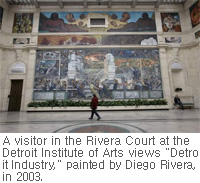 DIA millage: Proposal heads toward vote in Wayne County
DIA millage: Proposal heads toward vote in Wayne County
The Wayne County Commission cleared the way Thursday for the Detroit Institute of Arts to ask voters to approve a property tax measure to help fund the struggling institution.
The commission overwhelmingly approved a measure to create a nine-member art authority whose job is to write the proposal and set a date as early as the August primary. The museum is seeking 0.2 mill in Wayne, Oakland and Macomb counties, the equivalent of $20 on a home worth $200,000.
The measure was approved Thursday in a committee meeting involving the full commission. A final vote will come April 5 at the commission's regular meeting, where passage is expected because Thursday's 12-2 vote, with one absence, was an overwhelming margin of victory.
DIA officials have been quietly lobbying commissioners in all three counties since last summer with the intent of landing on the August ballot. They say they believe that securing support in the museum's home county of Wayne sends an important signal to Oakland and Macomb officials, who are weighing similar measures to create the authorities that would seek the millage.
"This was a very important step," said DIA Director Graham Beal.
Each county would have its own art authority and passage or denial by voters in one county would not affect the others. Thursday's move in Wayne allows for the commission to select six members of the authority and County Executive Robert Ficano to select three.
If voters in all three counties approve the measure, it could mean roughly $20 million-$23 million in annual operating funds for the DIA for the next 15 years -- $9 million from Wayne, $11 million from Oakland and $3 million from Macomb.
Beal told Wayne commissioners Thursday that the DIA would propose free admission for residents of counties that passed the millage.
DIA officials remain in discussions with Oakland and Macomb officials, where a vote to create their art authorities is not expected until mid-April at the earliest. DIA officials say the clock is ticking, and the authorities need to be in place by May to meet legislative deadlines and allow time for launching an effective millage campaign.
During an economic development committee meeting Thursday, several Macomb County commissioners signaled their support for allowing voters to decide on a DIA millage, though at least one said many county residents had limited interest in the museum.
"A lot of people I know who work in the factories would not have an interest in this," said Roland Fraschetti, a Republican from St. Clair Shores.
Fraschetti said the museum should do more to target regular museum-goers and donors with means, and that a millage would fall hard on those residents who can least afford it. Still, he said he could support allowing voters to decide whether it appears on the November general election ballot rather than in August.
The DIA is seeking the millage to cope with debilitating annual operating gaps of roughly $10 million-$12 million. Despite raising hundreds of millions dollars during the last decade, the museum has never been able to adequately replace state funding, which amounted to 70% of its budget until cuts began in the early 1990s. Where the DIA once received $16 million in annual state funding, it received zero this year, while also facing the impact of the recession and increasing fatigue among its donors.
Two years ago, the museum laid off staff and dramatically cut back on special exhibitions and programs to slice its budget by about 20%, from $32 million to $25.4 million. Money comes from individuals, corporations and foundations. The museum currently gets zero annual dollars from public funds, and in recent years, received less than 2% of its budget from the city.
"Our business model is broken," Beal told commissioners. "We've been fund-raising like mad, and we have no debt, but this is unsustainable."
DIA officials argue that a steady stream of public money for operations would allow the museum to fund-raise for its endowment to stabilize the institution in perpetuity. Beal outlined a bleak future should the millage fail, with the museum being open only a few hours a day on weekends and having no special exhibitions or programs.
The two Wayne County commissioners who voted against the measure Thursday made clear they were objecting to a likely public vote in the August primary, when turnout is typically less than half of the November general election. Chairman Gary Woronchak, a Dearborn Democrat, said the commission should be advocating for the interests of voters, not the museum.
"Our role is to represent the people," he said.
It's typically easier for ballot measures to pass in primaries because the political din of a presidential election makes it hard to grab the ear of the public. But museum officials maintain that another critical issue is the cost of political advertising in a general election. Museum Chief Operating Officer Annmarie Erickson said it would cost millions more to run a campaign for November.
Timing could remain an issue. Wayne County commissioners could press for authority candidates who favor the later date. Fraschetti's skepticism also made clear that timing could be a sticking point for his county.
 DIA millage: Proposal heads toward vote in Wayne County
DIA millage: Proposal heads toward vote in Wayne County